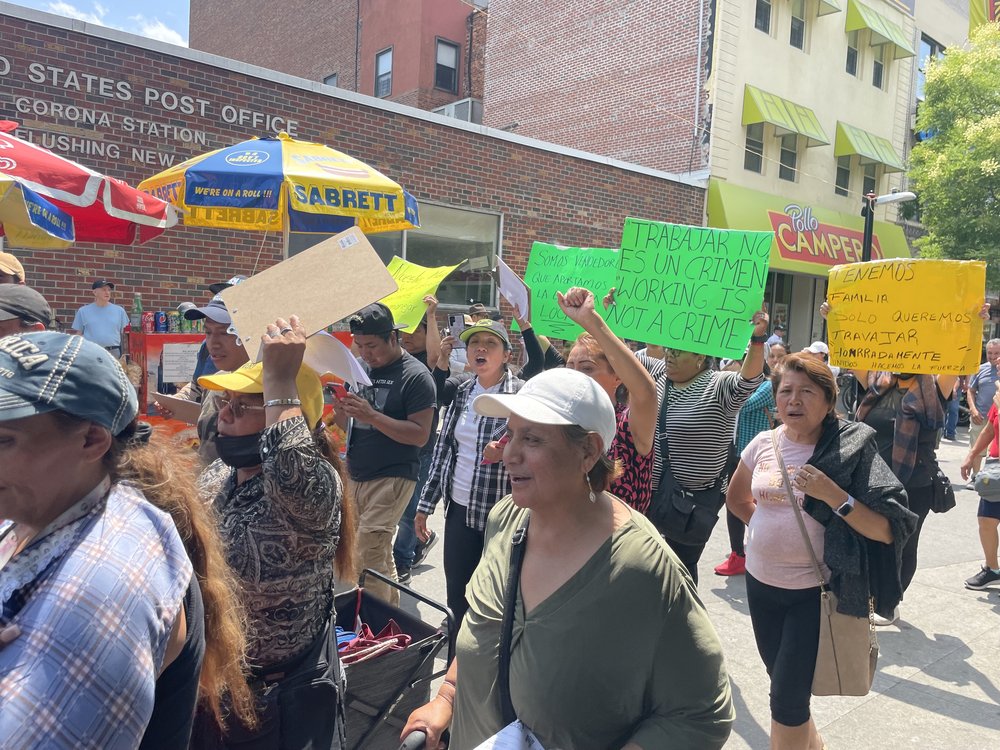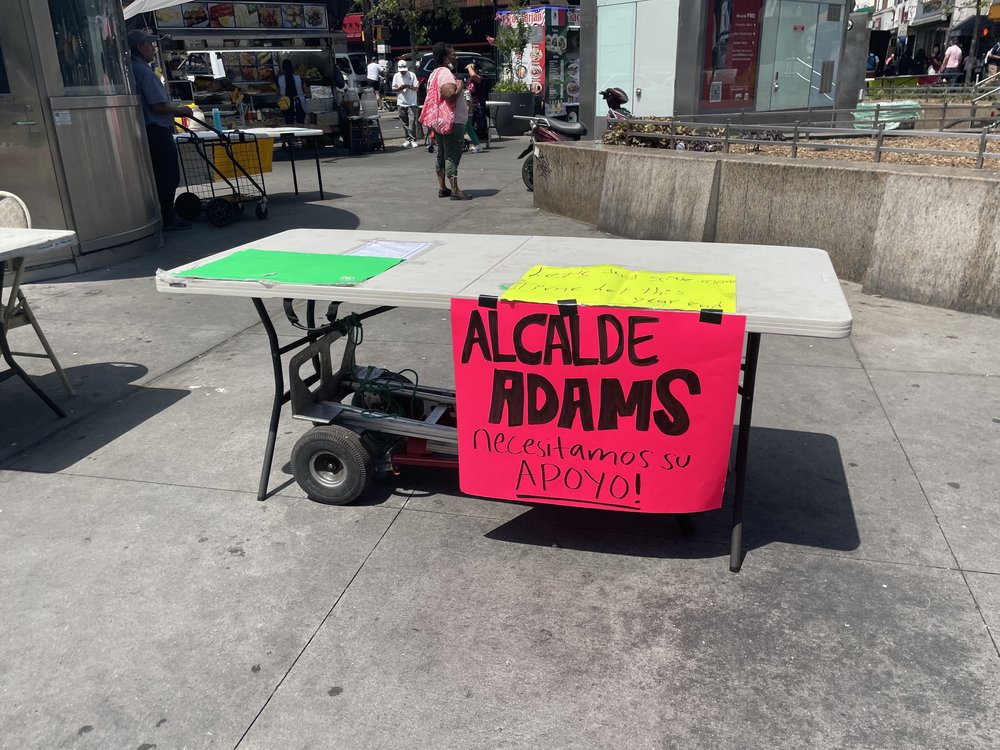Corona Plaza vendors rally against City Hall's latest enforcement sweep
Aug. 2, 2023, 5:01 a.m.
The sweep came as a bombshell for the vendors, who had been cooperating with city officials to address community concerns.

Dozens of vendors who’ve set up shop at Corona Plaza in Queens are criticizing the Adams administration for suddenly cracking down on enforcement despite working with city officials and agencies for months to address concerns of overcrowding and cleanliness.
The plaza, which blossomed with local vendors at the height of the pandemic and was the early epicenter for the outbreak in New York, was scarcely populated Tuesday following a sweep by the Department of Sanitation last week that left many blindsided. Instead, the usual stands offering snacks and tchotchkes from all around South America were replaced by brightly colored signs and posters, as sanitation police continue to regularly patrol the area.
“También somos parte de la economía de esta ciudad,” one poster read, which translates to “we’re also part of the economy of this city.”
“We want dialogue, not harassment,” another poster said.
Vendors and their allies in elected office — including Queens Borough President Donovan Richards and Rep. Alexandria Ocasio-Cortez — plan to hold a rally on Wednesday condemning the Adams administration’s latest enforcement efforts.
“We want to work. We’re not asking the government to support us,” Rosario Troncoso, the president of the Corona Plaza Street Vendors' Association, told Gothamist Tuesday. “Now, with these days we haven't worked, we can't pay for rent, electricity, food.”
Over 80 vendors in the plaza, who are mostly Latin American immigrants, agreed to follow a code of conduct — like properly disposing of trash and limiting the size of their stalls — when they joined the nonprofit alliance formed this spring. The vendors and their families marched around the corridor on Tuesday chanting, “No nos vamos, aquí estamos,” which means “We won’t leave, we are staying here!”

“What happened last week was disgusting,” said Richards. “All of this work was being done with all of the city agencies. And they threw the baby out with the bath water.”
Richards convened a task force over a year ago with the vendors and multiple agencies to address community concerns over the growing vendor hotspot. The task force was able to secure the installation of trash bins to collect garbage accumulating in the area.
“This is not a way to make a community safer – by eliminating their income streams,” Richards added.
Like most street hawkers in the city, the vast majority of the vendors in the plaza don’t have one of the city’s highly coveted and limited permits. Just a few thousand permits exist for the city’s estimated 20,000 vendors and counting across the city, with a lengthy yearslong waitlist.
Carina Kaufman-Gutierrez, the deputy director of the Street Vendor Project, urged City Hall to expedite permits for vendors in Corona Plaza.
"Corona Plaza is a thriving cultural and economic hub driven by local street vendors. We are asking the administration to work with interagency Corona Plaza Task Force to formalize this unique market by expediting the permitting process with the Department of Transportation. In the meantime, stop the sweeping crackdowns that are leaving 100 families without income," she said, adding that vendors collected nearly 3,000 signatures from people in support of the vendors' cause in recent days.
Late last week, sanitation police told vendors without a license or permit to leave the bustling area — shortly after Mayor Eric Adams visited to see firsthand the complaints the city had received about “illegal vending.”
Sanitation department spokesperson Joshua Goodman maintains that the enforcement actions last week were “thoughtful,” “careful” and “slow-moving.” DSNY police also gave the Corona Plaza vendors a warning earlier in the week about upcoming enforcement actions.
“The Adams administration is committed to protecting public safety, sidewalk access and cleanliness while allowing legal vendors to do their work safely,” Goodman said in a statement. “That is why DSNY engaged in a limited enforcement action in the Corona Plaza area last week, following many requests from community members to do so and significant public outreach.”
Last week’s sweep appears to contradict what the sanitation department commissioner said in a City Council hearing this spring, noting that the agency is focused on a “compliance-first approach,” rather than a “license-check-first approach” to vendor enforcement.
Goodman says the agency’s approach remains the same, but the situation at Corona Plaza had become “untenable,” with “dirty conditions” and “illegal vending” in front of stores, that it was necessary to disperse the unpermitted vendors from the plaza. He said the city confiscated five abandoned vending setups and issued one summons to a vendor for blocking the sidewalk.
The bustling Corona Plaza market, where many local residents turned to vending after losing their jobs during the pandemic, has grown to include nearly 100 vendors. It has received praise from TikTok food influencers and was ranked as one the city's top 50 restaurants by the New York Times’ critic Pete Wells.
Seth Bornstein, the director of the Queens Economic Development Corporation, called the market a “centerpiece” of Corona and a vital center of commerce in the lower-middle-class immigrant neighborhood.
“There's still a number of other issues, but we were working together closely through the borough president’s task force to make it a better place. “And going in there and cleaning up the way they did was the wrong way to do it,” Bornstein said.
Meanwhile, Councilmember Francisco Moya, who represents the area, has called on the city to intervene to address long-standing complaints around vending in the plaza.
While Moya was unavailable for an interview, his spokesperson Chantal Alba said his office frequently receives complaints about vendors, who generate up to 20 complaints per week, such as stealing competition from brick-and-mortar businesses, blocking the sidewalk and improperly disposing of trash.
Richards, Bornstein and other advocates acknowledge that some vendors are not following the agreed-upon rules, like obstructing the sidewalk. But Richards said the sanitation department should enforce compliance rules, and avoid “heavy” enforcement that targets vendors just because they don't have a license or permit.
“We want them, the administration to come back to the table to continue to work with us,” Richards said.
This story was updated to include comment from Carina Kaufman-Gutierrez, the deputy director of the Street Vendor Project.